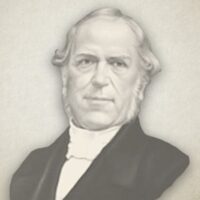
Chapter 17—On Communion, Answering The Proof For Open Communion In John 3:5
Mr. Bridgman: “St. Paul’s criterion would not be cold water, little or much, but the living water of the Spirit, such as Christ spoke of to Nicodemus, and at the last day of the feast.” John iii. 5. vii. 37.
My Reply:
1. If your spirit never be admitted into heaven till you can prove that Paul the apostle as the Lord’s servant ever admitted, or that the sentiment as the truth of God ever entered his heart to admit, persons to the table of the Lord without their being first baptized on a personal profession of their faith in our Lord Jesus Christ, you will never, no never, see the face of Jesus, my brother.
2. The work of divine grace in the heart, to the production of repentance toward God, and faith in our Lord Jesus Christ, is the criterion whereby that the soul is interested in the everlasting covenant of God’s favor, and all the fullness of our Lord Jesus Christ unto everlasting life, may be safely concluded; and that is also a scripture criterion for baptism, and baptismal profession of faith in Christ, is the scripture order of coming to the Lord’s table of communion, without one text to the contrary, or one fairly doubtful. Now you hear all this, and if it be not true, contradict it at once with the truth of God’s word; or we shall wax bold by your silence through impotency.
3. We contend as much and as earnestly for the oil, wine, and water of divine unction, influence, and life, and all the pure blessings of free grace, by the power and ministry of the Holy Spirit, as the entire spring and sole maintenance of all vital and true godliness in the heart, for and unto the kingdom of God, as you do, or ever did, my brother, and that always so; although it is no uncommon insinuation, and as glaringly false as common, that we deny the vital work of the Spirit in contending for the ordinance of believers’ baptism. But if believers’ baptism, although an undeniable scripture ordinance, is to be set aside and rejected, because it is but an ordinance, and is no vital part of the matter of salvation, and can answer no purpose more than an instituted means and ordinance of representation of vital things—what instituted ordinance of God for our practical observation is there that might not be equally set aside by the same rule? The power productive of any spiritual good, is not in any means, but in Him that appoints them; and he works by them as he pleases. He hath appointed ram’s horn and earthen vessel instruments and means, whereby he will do his pleasure, and commands to be worshipped, that the excellency of the power may be of him, and that all creature pride and supposed excellency may be laid deep buried beneath the feet of his greatness and goodness. Scripture ordinances therefore are none of them to be set aside because they are no more than what they are, any more than any of them are to be set in the place of God, because they are what they are: everything is good in its appointed place, order, season, and design. Eccles. iii. 11.
John Foreman (1792-1872) was a Strict and Particular Baptist preacher. He was appointed the Pastor of Hill Street Chapel, Marylebone, serving this position for close to forty years.
JOHN FOREMAN'S LIFE AND MINISTRY
JOHN FOREMAN ON DUTY FAITH (COMPLETE)
JOHN FOREMAN'S BAPTISM AND COMMUNION CONSIDERED (COMPLETE)




